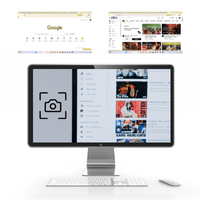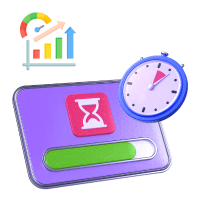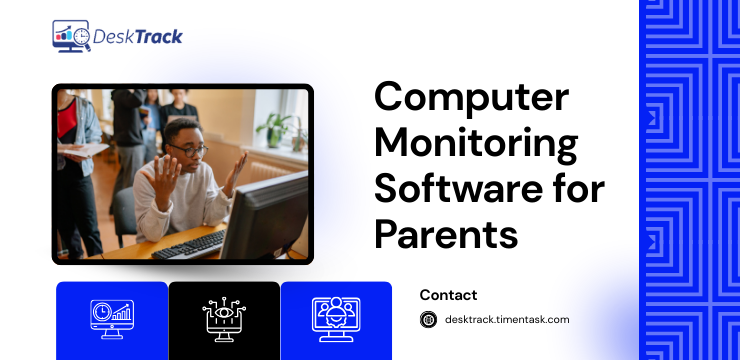Unlimited Paid Time Off (PTO) policies have gained attention in recent years as a potential solution to the challenges of traditional vacation policies. The concept of unlimited PTO is straightforward: rather than having a set number of vacation days, employees can take time off as needed without any predefined limits. While this might sound like a dream come true for employees, it’s crucial to understand the potential advantages and disadvantages before implementing such a policy in your workplace. In this blog post, we will explore the pros and cons of unlimited PTO and help you determine if it’s the right fit for your organization through the use of employee time-tracking software like DeskTrack.
What is Unlimited PTO?
Unlimited PTO, or discretionary or flexible time off, refers to a policy allowing employees to take time off without any predetermined limits. Unlike traditional PTO policies that allocate a specific number of vacation days, unlimited PTO grants employees the free choice to decide when, where, and how much time they need off within reasonable boundaries set by the company. The focus shifts from tracking days off to achieving results and maintaining a healthy work-life balance which can be done through employee activity tracking software like DeskTrack. This policy acknowledges that employees are responsible adults who can manage their time effectively and take the necessary breaks to rejuvenate.
Types of Unlimited Paid Time Off
1. Open-Ended Unlimited PTO
This type of unlimited PTO places no cap on an employee’s time off. Employees have complete freedom and flexibility to determine the duration and frequency of their vacations, as long as it is not interfering with work responsibilities and team dynamics.
2. Negotiated Unlimited PTO
Some organizations offer negotiated unlimited PTO, which involves discussions between employees and their managers to establish a mutually agreed-upon time off plan. This allows for a more open and structured approach to time off. Ensuring that both the employee’s needs and the company’s operational requirements are considered indirectly improves productivity that can be tracked easily via using productivity monitoring software like DeskTrack.
3. Capped Unlimited PTO
In capped unlimited PTO policies, there is a predefined maximum limit on the amount of time off an employee can take within a given period. This provides some boundaries while still offering more flexibility than traditional PTO policies.
4. Combined PTO and Sick Leave
Another variation of unlimited PTO combines vacation and sick leave into a single category. Employees can take time off for planned vacations and unexpected illnesses, eliminating the need for separate sick days. For this organizations can opt for employee monitoring software like DeskTrack.
In the coming sections, we will deeply discuss the pros and cons of unlimited PTO and evaluate its impact on employees and organizations. By understanding these factors, you can decide whether unlimited PTO is suitable for your workplace.
Pros of Unlimited PTO
Unlimited PTO offers several benefits that can contribute to a positive work environment and employee satisfaction which also improves the organization’s productivity and can be easily tracked using productivity tracking software.
1. Enhanced Work-Life Balance
Unlimited PTO allows employees to take time off as needed without worrying about strict limits or accrued time. This flexibility empowers individuals to prioritize their personal lives and maintain a healthier work-life balance.
2. Increased Autonomy and Trust
Unlimited PTO demonstrates trust and confidence in their ability to fulfill their responsibilities by providing employees with the freedom to manage their time off. This can boost morale and foster a sense of ownership among employees.
3. Reduced Burnout and Increased Productivity
Regular breaks and time off are essential for avoiding burnout. With unlimited PTO, employees can recharge and return to work with renewed energy and focus, increasing productivity of employees.
4. Attraction and Retention of Top Talent
Offering unlimited PTO can be a robust recruitment and retention tool. It appeals to the preferences of new generations and can help your organization stand out in a competitive job market.
5. Business Cost Control
Unlimited PTO policies can control business costs. Organizations can reduce the liability associated with traditional PTO policies without the need to accrue or pay out unused vacation days.
Cons of Unlimited PTO
While unlimited PTO has advantages, it also presents challenges and potential drawbacks.
1. Tracking and Management Complexity
Unlimited PTO can be more challenging to track and manage than traditional PTO policies. Without clear guidelines and tracking systems, ensuring fair distribution and preventing abuse may be difficult, but here if you use DeskTrack employee monitoring software then it provides a great help.
2. Potential for Abuse and Lack of Accountability
In the absence of specific limits, there is a possibility that employees might misuse or abuse the unlimited PTO policy. With proper accountability measures, it can lead to disruptions in workflow and positively impact team dynamics.
3. Uncertainty and Potential for Misuse
Employees may feel uncertain about how much time off is appropriate to take or worry about the perception of taking too much time off. This uncertainty can affect their decision-making and potentially hinder their ability to benefit from the policy entirely.
4. Cultural Barriers and Company Norms
Implementing an unlimited PTO policy requires a cultural shift and aligning employee expectations. In organizations with a robust workaholic culture, employees may hesitate to take time off or feel pressure to work even when they should be taking a break.
Comparison to Traditional PTO Policies
Unlimited PTO differs significantly from traditional PTO policies in several aspects.
1. Flexibility and Personalization
Unlimited PTO allows employees to take time off as needed, allowing for more personalized scheduling. Traditional PTO policies, on the other hand, typically have specific limits and accrual systems.
2. Employee Satisfaction and Engagement
Unlimited PTO can boost employee engagement and satisfaction by providing greater autonomy and work-life balance. Traditional PTO policies may be perceived as more restrictive, leading to potential dissatisfaction among employees.
3. Industry and Job Role Considerations
The suitability of unlimited PTO varies across industries and job roles. Some drives may have operational constraints that make it challenging to implement unlimited PTO effectively. Additionally, job roles with specific deadlines or client expectations may require more structured time off.
Is Unlimited PTO Right for Your Workplace?
Unlimited Paid Time Off (PTO) policies have gained popularity recently, offering employees more freedom and flexibility in managing their time off. However, determining if this approach suits your workplace requires careful consideration. The key is to weigh the benefits and disadvantages to make an informed decision.
Unlimited PTO can positively impact employee morale and satisfaction. It fosters a sense of autonomy, trust, and work-life balance. Employees feel empowered and strong to take the time off they need without worrying about limited PTO accruals and the organizations can keep an eye via using DeskTrack System Monitoring Software for Employees.
On the other hand, implementing unlimited PTO requires establishing clear guidelines and expectations. Misuse and abuse can occur without proper procedures, impacting productivity and team dynamics. Assessing your company’s culture, workload requirements, and level of accountability within your workforce is crucial in determining if unlimited PTO aligns with your workplace.
Best Practices for Implementing Unlimited PTO
To successfully implement unlimited PTO, the following best practices can help create a positive and productive work environment:
1. Establish Clear Guidelines
Define reasonable usage and communicate expectations to employees. Encourage open communication and transparency regarding time-off requests.
2. Encourage Planning and Coordination
Encourage employees to plan and coordinate their time off with their team members. This helps manage workload and ensures smooth operations during absences.
3. Address Workload Management
Implement systems and tools to help employees manage workload effectively, especially during peak periods or when team members are on leave.
4. Train Managers
Train managers on effectively managing time off requests, ensuring fairness and consistency in granting approvals.
5. Regular Evaluation
Continuously assess and adapt the policy based on employee feedback and evolving needs. Regularly reviewing and adjusting the policy helps maintain its effectiveness.
Legal and Compliance Considerations
Before implementing an unlimited PTO policy, it is essential to consider legal and compliance factors. While unlimited PTO offers flexibility, it must align with applicable labor laws and regulations to ensure fair and consistent practices.
1. Review Employment Laws
Understand the laws and regulations related to paid time off in your jurisdiction. Ensure compliance with minimum leave requirements, such as sick or parental leave.
2. Consistent Application
Apply the policy consistently across all employees to avoid potential discrimination claims. Ensure that the policy is clear and uniformly implemented.
3. Record-Keeping
Maintain accurate records of time off requests, approvals, and usage to demonstrate compliance with legal requirements and fair treatment.
4. Consult Legal Experts
Seek legal advice to ensure your unlimited PTO policy complies with local employment laws and regulations. Addressing legal considerations can mitigate potential risks and legal challenges while providing your employees with a fair and flexible time-off policy.
Alternative Time Off Policies
When providing time off to employees, unlimited Paid Time Off (PTO) policies have gained attention for their flexibility and employee-centric approach. However, it’s essential to consider alternative time off policies before deciding if unlimited PTO is the right fit for your workplace. Let’s explore these alternatives and their potential benefits and limitations.
1. Traditional Accrual-Based PTO
Many companies utilize a traditional PTO policy, where employees earn certain vacation days based on their tenure. This approach provides structure and predictability, allowing companies to manage employee absences effectively. However, it may limit employees’ ability to take time off when needed, as their vacation days accumulate gradually.
2. Fixed or Banked PTO
With a fixed PTO policy, employees are allocated a specific number of days off per year, typically at the beginning of the year. This approach offers more predictability and allows better workforce planning. However, it may not accommodate individual needs or unexpected circumstances that require additional time off.
3. Flexible Scheduling
Instead of focusing solely on time off, some companies use flexible scheduling software for employees. This allows employees to have more control over their work hours and accommodate personal obligations or interests. While it doesn’t directly address vacation time, it promotes work-life balance and can be combined with other time off policies.
4. Remote Work
Remote work policies enable employees to work from locations outside of the traditional office environment. This approach offers increased flexibility in terms of when and where work is performed, allowing employees to manage their time more effectively. However, clear guidelines and communication may be required to ensure productivity and maintain team collaboration.
5. Sabbaticals and Leave Programs
Sabbaticals and extended leave programs offer employees longer periods off, often for personal or professional development. These programs can benefit rejuvenation, skill-building, and overall employee well-being. However, they require careful planning and coordination to manage workflow and ensure coverage during an employee’s absence.
Conclusion:
In conclusion, unlimited Paid Time Off (PTO) policies offer a flexible and employee-centric approach to time off. They promote work-life balance, increase autonomy and trust, and can attract and retain top talent. However, implementing unlimited PTO requires careful consideration of potential challenges, such as tracking and management complexity, possible abuse, and cultural barriers. Establishing clear guidelines, encouraging planning and coordination, and addressing workload management is crucial.
Additionally, legal and compliance considerations must be taken into account. By evaluating alternative time-off policies and aligning them with your organization’s needs, you can determine if unlimited PTO is the right fit for your workplace. Remember, balancing flexibility and accountability is critical to creating a positive and productive work environment. If you are in this doubt, that how you will manage time tracking and other activities of your employee, you can visit DeskTrack which is counted as one of the top employee time tracking software.
















